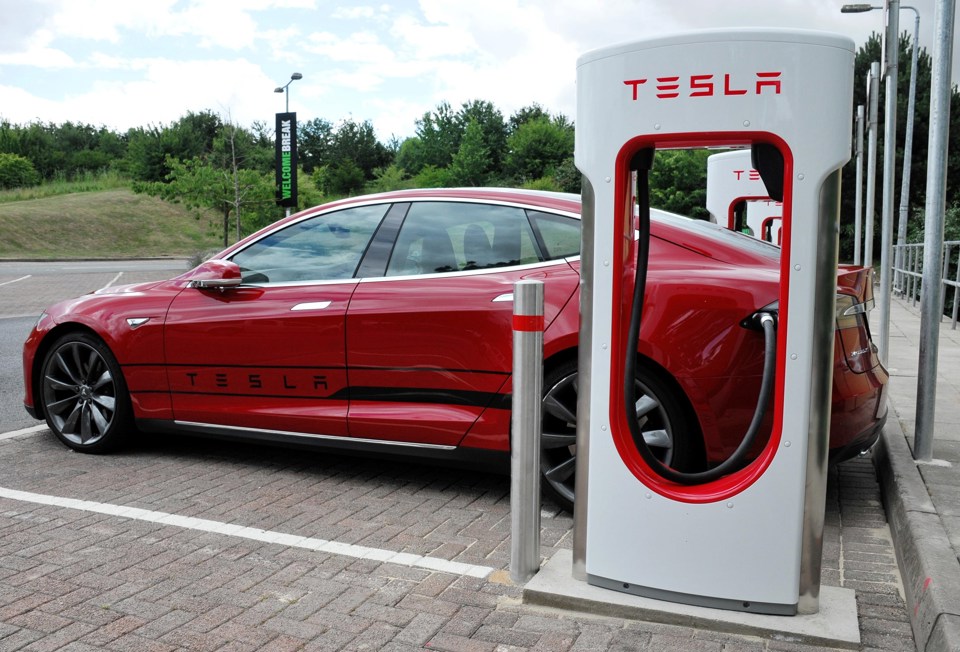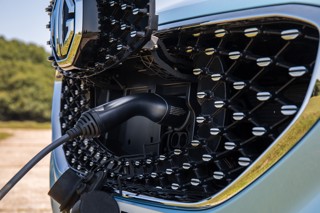Tesla will enable cars from other manufacturers to use its Supercharger network later this year, according to Elon Musk.
The company’s CEO made the announcement on Twitter, but no further details of the arrangement have been outlined.
His tweet said: “we’re making our Supercharger network open to other EVs later this year.”
Currently the Tesla Supercharger Network is available exclusively to Tesla drivers, meaning units in the UK do not have to meet the Government’s requirements for ad-hoc access to public charging.
The Supercharger points provide up to 250kW of charging power, but would require users of non-Tesla vehicles to use a socket adapter for compatibility. There are currently 600 charge points in the network.
Telsa’s Supercharger network was found to be the nation’s favourite in a recent poll by What Car?.
Users rated it very highly for reliability, charging speed, ease of payment and value for money, giving it an overall score of 89.8%.
Drivers of other electric vehicles told What Car? that the Instavolt network was their preferred public charger. It achieved an overall score of 81.2% and was the top scoring network for reliability with 92.6%.
Gridserve’s Electric Highway gained the highest score of 74.9% for location, the motorway network was rated worst for reliability, scoring just 23.7%. This network was previously operated by Ecotricity and has only recently been taken over by Gridserve, which has promised to revamp every location by the end of this year.
Steve Huntingford, editor, What Car?, said: “Our investigation highlights the significant differences between electric car public charging networks. Those that offer the fastest charging speeds are not necessarily the best to use, and some of the most affordable can also be the most inaccessible. As more people switch to EVs the demand for public chargers will increase, and EV owners really do need to shop around to find the best charging solutions.”
When it comes to charging speed, Tesla took the lead and scored 95.5%, followed closely by Ionity with 95.3% - both providers offer charging speeds of above 200kW.
Tesla’s flat charging fee of 28p per kWh helped it gain the best score for value for money, too, whereas Ionity’s 69p per kWh charge earned it a rating of just 19.5%, the worst in What Car?’s data.
The easiest networks to use were those that allowed drivers to tap and pay and didn’t require them to register, while those with glitchy apps, lengthy sign-up processes or a requirement to use a physical charging card to activate a charge point were rated down in this area. Worst of all was Charge Place Scotland, which has a complex registration process and took 10 days to send out a charging card, without which you can’t access the network.
However, it was Charge Your Car that came last overall because its charge points were deemed unreliable and in What Car?’s experience were frequently blocked by other vehicles because they were at the roadside with no dedicated electric car bays. It scored just 26.6% for reliability and 34.4% for location, and managed only 43.5% overall.
What Car? charge point survey results:
|
Company |
Reliability |
Location |
Charging speed |
Value for money |
Ease of payment |
Overall score |
|
1 Tesla |
83.7% |
74.3% |
95.5% |
95.5% |
100% |
89.8% |
|
2 Instavolt |
92.6% |
63.5% |
79.0% |
71.0% |
100% |
81.2% |
|
3 Osprey |
80.6% |
71.3% |
61.7% |
69.8% |
100% |
76.7% |
|
4 Shell Recharge |
75.0% |
53.5% |
91.7% |
57.5% |
100% |
75.5% |
|
5 Pod Point |
70.3% |
69.9% |
54.7% |
93.0% |
70.0% |
71.6% |
|
6 Gridserve Electric Highway |
23.7% |
74.9% |
84.6% |
67.6% |
100% |
70.2% |
|
7 BP Pulse |
36.9% |
45.0% |
87.2% |
52.0% |
100% |
64.2% |
|
8 Ionity |
60.6% |
61.4% |
95.3% |
19.5% |
70.0% |
61.4% |
|
9 Engie |
53.8% |
54.5% |
59.5% |
91.9% |
40.0% |
59.9% |
|
10 Charge Place Scotland |
55.0% |
63.7% |
60.5% |
90.9% |
20.0% |
58.0% |
|
11 GeniePoint |
58.5% |
34.6% |
55.0% |
70.8% |
70.0% |
57.8% |
|
12 Charge Your Car |
26.6% |
34.4% |
49.2% |
67.2% |
40.0% |
43.5% |























Login to comment
Comments
No comments have been made yet.